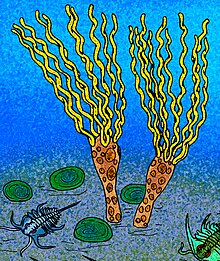The Eocrinoidea are an extinct class of echinoderms that lived between the Early Cambrian and Late Silurian periods. They are the earliest known group of stalked, arm-bearing echinoderms, and were the most common echinoderms during the Cambrian.
| Eocrinoidea Temporal range:
| |
|---|---|

| |
| Eocrinoid holdfasts (Middle Ordovician, Utah) | |

| |
| Colourful reconstruction of Gogia ojenai | |
| Scientific classification | |
| Domain: | Eukaryota |
| Kingdom: | Animalia |
| Phylum: | Echinodermata |
| Subphylum: | †Blastozoa |
| Class: | †Eocrinoidea Jaekel, 1899 |
| Groups included | |
| Cladistically included but traditionally excluded taxa | |
| |
Eocrinoids were a paraphyletic group that may have been ancestral to six other classes: Rhombifera, Diploporita, Coronoidea, Blastoidea, Parablastoidea, and Paracrinoidea. They may also be the progenitors of the cystoids, who are believed to be ancestral to modern crinoids. The earliest genera had a short holdfast and irregularly structured plates. Later forms had a fully developed stalk with regular rows of plates. They were benthic suspension feeders, with five ambulacra on the upper surface, surrounding the mouth and extending into a number of narrow arms.[5][6] An unusual Ordovician form was the conical Bolboporites with its single brachiole.[7][8] See also List of echinodermata orders.
Phylogeny
editReferences
edit- ^ Smith 1984, p. 439
- ^ Smith 1984, p. 439
- ^ Smith 1984, p. 439
- ^ Smith 1984, p. 439
- ^ Prothero, D.R.,2004, Bringing Fossils to Life; An Introduction to Paleobiology (2 ed.):New York, The McGraw-Hill companies, p. 324
- ^ Barnes, Robert D. (1982). Invertebrate Zoology. Philadelphia, PA: Holt-Saunders International. pp. 1007–1008. ISBN 978-0-03-056747-6.
- ^ Rozhnov, S.V. 2009. Eocrinoids and paracrinoids of the Baltic Ordovician basin: a biogeographical report. IGCP Meeting, Ordovician palaeogeography and palaeoclimate, Copenhagen, p. 16.
- ^ Rozhnov, S.V. and Kushlina, V.B. 1994. Interpretation of new data on Bolboporites Pander, 1830 (Echinodermata; Ordovician), p. 179-180, in David, B., Guille, A., Féral, J.-P. & Roux, M. (eds.), Echinoderms through time (Balkema, Rotterdam).
- ^ Samuel Zamora and A. B. Smith (2011). "Cambrian stalked echinoderms show unexpected plasticity of arm construction". Proceedings of the Royal Society B. 279 (1727): 293–298. doi:10.1098/rspb.2011.0777. PMC 3223674. PMID 21653588.
Works cited
edit- Smith, Andrew B. (1984). "Classification of the Echinodermata". Palaeontology. 27 (3): 431–459.
External links
edit- Palaeos on Eocrinoids
- Evolutionary palaeoecology of early epifaunal echinoderms
- Cambrian explosion with Eocrinoid information Archived 2006-09-12 at the Wayback Machine